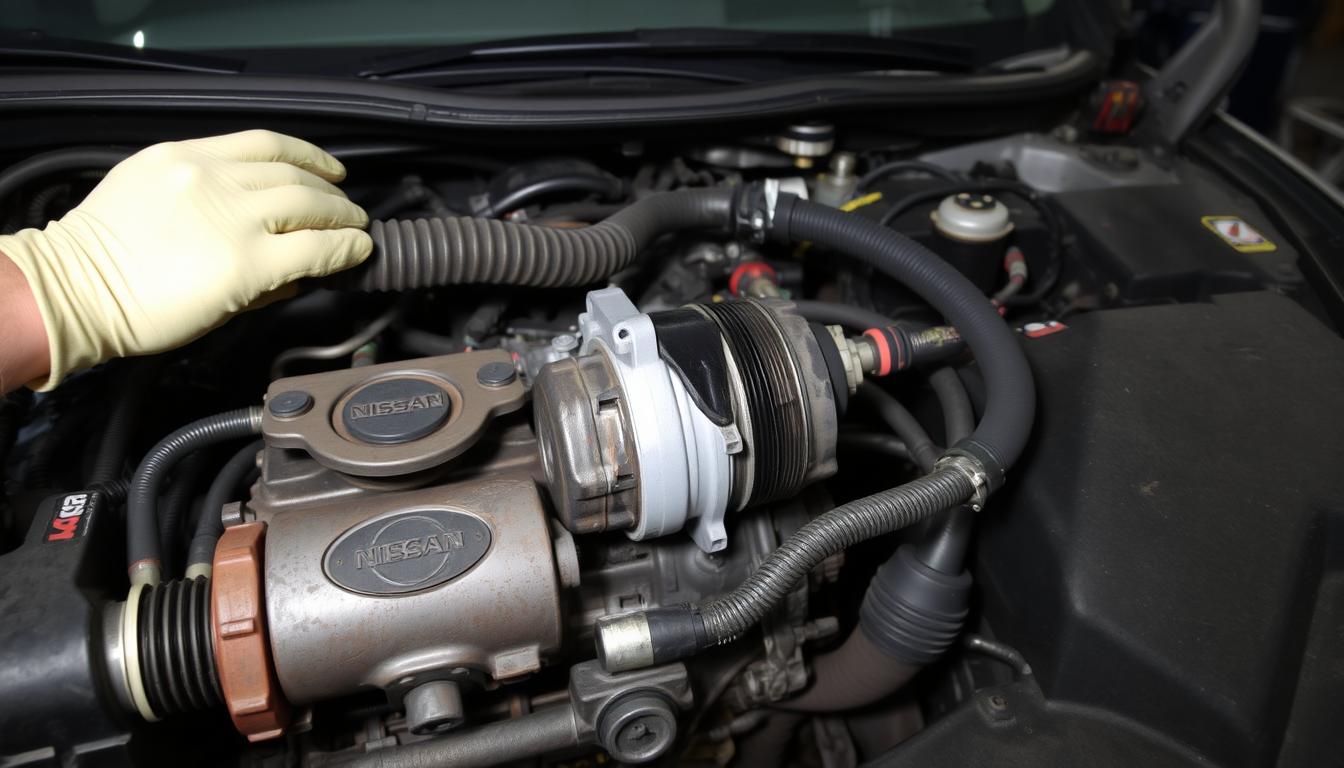Nissan Altima owners often face AC compressor issues, which can be frustrating, even in hot weather. A working AC is key for a comfortable drive. If it fails, it’s a big problem. The average cost for fixing a Nissan Altima AC is $111, with $16 for parts and $95 for labor. This article will cover common AC compressor problems and solutions for Altima owners.
AC problems in the Altima can stem from low refrigerant, a worn compressor, or a broken condenser. Knowing the causes helps find the right fixes. The AC compressor is vital for cooling the car. Issues with it can cause poor cooling, strange noises, and no AC at all.
Nissan Altima AC compressor problems fall into hydraulic, electric, and mechanical categories. Regular maintenance and professional installation can prevent many issues. By understanding the AC compressor and its parts, Altima owners can fix air conditioning problems. This ensures the AC compressor works right.
Key Takeaways
- Common Nissan Altima AC compressor problems include low refrigerant, worn compressor, and broken condenser.
- The average cost for a Nissan Altima AC not working inspection is $111.
- Regular maintenance and professional installation are crucial to preventing AC compressor issues.
- Understanding the causes of AC problems is essential to finding the right solutions.
- Nissan Altima AC compressor problems can be categorized into hydraulic, electric, and mechanical issues.
- Addressing AC issues promptly can ensure a comfortable driving experience and prevent further damage to the vehicle.
Understanding Your Nissan Altima’s AC Compressor System
The Nissan Altima’s air conditioning system keeps your car cool. It uses refrigerant to cool the air inside. Knowing how it works helps fix common problems.
Key Components of the AC System
The Altima’s AC system has five main parts. These are the compressor, condenser, receiver/drier, expansion valve, and evaporator. The compressor makes the refrigerant flow. The condenser cools it down.
The receiver/drier removes moisture. The expansion valve controls the refrigerant flow. The evaporator cools the air inside the car.
How the AC Compressor Functions
The AC compressor is key to cooling your Altima. It makes the refrigerant flow through the system. This ensures the air stays cool.
If the compressor fails, cooling problems arise. This can make the AC system not work right.
Normal Operating Parameters
The AC compressor works best within certain pressure and temperature ranges. The low-side pressure is 25-45 psi. The high-side pressure is 200-250 psi, depending on the temperature outside.
Keeping these levels right is crucial. It helps cool the car efficiently and prevents damage. Regular checks can spot problems early.
| Component | Normal Pressure Range | Temperature Range |
|---|---|---|
| Low-Side Pressure | 25-45 psi | Typically 40-55°F |
| High-Side Pressure | 200-250 psi | Typically 80-115°F |
| Compressor Temperature | N/A | 120-145°F |
Signs of a Failing AC Compressor in Your Altima
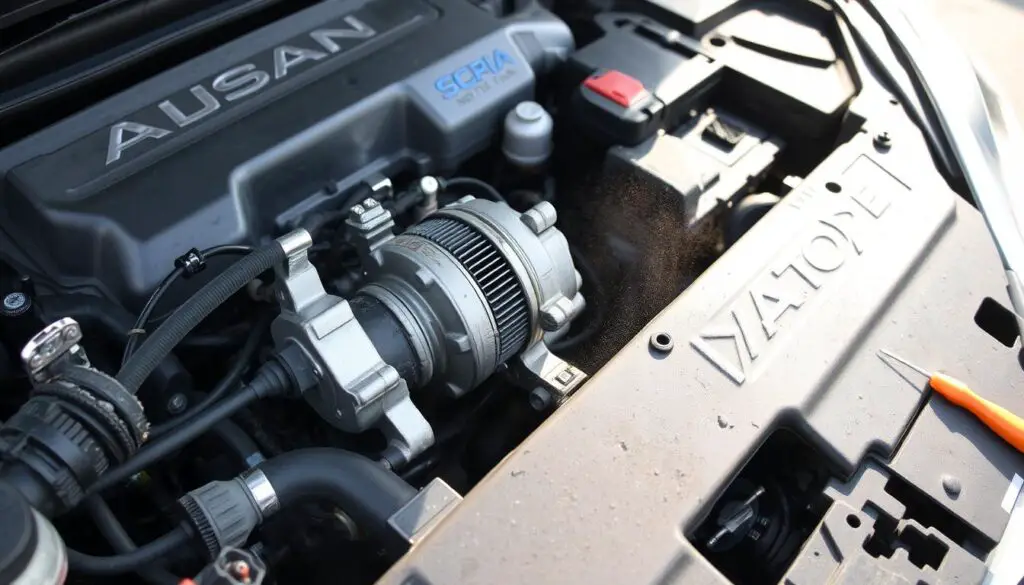
Spotting Nissan Altima cooling system problems early can prevent expensive fixes later. Here are signs your Altima’s AC compressor might be on the fritz:
- Reduced Cooling Efficiency: If your car’s cooling isn’t as strong, it might be leaking refrigerant or have compressor trouble.
- Unusual Noises: Hearing odd sounds like chattering or squealing means there’s a problem inside the compressor.
- Visible Wear or Damage: Seeing corrosion or damage on the compressor means it’s not working right.
- Lukewarm Air from Vents: If the air isn’t cool enough, it could be a blower motor or refrigerant issue.
- Compressor Clutch Issues: Trouble with the clutch means you need Altima AC compressor repair.
| Symptom | Possible Cause |
|---|---|
| Reduced Cooling Efficiency | Refrigerant leaks or compressor malfunctions |
| Unusual Noises | Internal compressor damage |
| Visible Wear or Damage | Corrosion affecting compressor functionality |
| Lukewarm Air from Vents | Faulty blower motor or refrigerant blockage |
| Compressor Clutch Issues | Requires Altima AC compressor repair |
Most Common Nissan Altima AC Compressor Problems
Owners of the Nissan Altima may face several AC compressor issues. These problems can affect the car’s cooling. Knowing these common issues helps in quick diagnosis and maintenance.
Compressor Clutch Failure
Altima AC compressor clutch issues can stop the compressor from working. This leads to poor cooling. Worn-out clutches or electrical problems are common causes. A Nissan Altima AC compressor replacement is often needed if not fixed quickly.
Refrigerant Leaks
Refrigerant leaks can make the AC less efficient. Even though the system is closed, leaks can happen. It’s crucial to find and fix these leaks to keep the AC working well.
Electrical Issues
Electrical problems, like faulty wiring or blown fuses, can mess with the AC compressor. These issues can cause the AC to cool intermittently or not at all. Professional help is needed to solve these problems.
Mechanical Failures
Mechanical failures, like worn bearings or damaged parts, can also affect the compressor. Regular checks and timely replacement can stop these problems before they get worse.
| Problem | Cause | Solution |
|---|---|---|
| Compressor Clutch Failure | Worn clutches or electrical faults | Replace the clutch or the entire compressor |
| Refrigerant Leaks | Heat, vibrations, wear and tear | Identify and seal leaks, refill refrigerant |
| Electrical Issues | Faulty wiring, blown fuses | Repair or replace electrical components |
| Mechanical Failures | Bearings wear, damaged components | Regular maintenance, replace compressor if needed |
Diagnosing AC Issues Through Sound
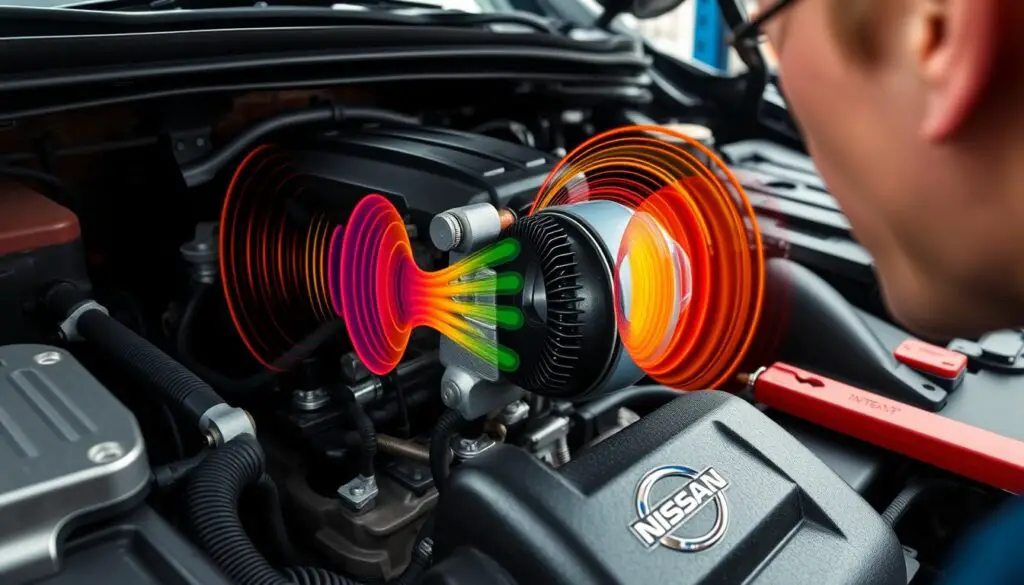
Listening for unusual sounds is key in fixing Altima air conditioning problems. Different noises can point to specific Nissan Altima AC compressor problems. Knowing these sounds helps find issues early and avoids expensive fixes.
Here are common sounds and what they might mean:
- Grinding: Grinding noise often means worn-out bearings in the compressor. This can make cooling less efficient and cause the compressor to fail.
- Squealing: Squealing sounds usually mean a loose or damaged serpentine belt. While not directly related to the compressor, a bad belt can harm the AC system’s performance.
- Rattling: Rattling noises are often from debris in the compressor or loose parts. This can cause cooling to work only sometimes and put more strain on the AC system.
- Clicking: Frequent clicking noises might mean the compressor clutch is engaging and disengaging wrong. This can cause cooling to change a lot.
By listening to these sounds, Nissan Altima owners can understand their AC system better. Spotting these sounds early helps with Altima air conditioning troubleshooting. This keeps driving comfortable.
If you hear any of these sounds, get a professional mechanic’s help. Fixing Nissan Altima AC compressor problems quickly can stop more damage. It also helps your vehicle’s air conditioning system last longer.
| Sound | Possible Issue | Recommended Action |
|---|---|---|
| Grinding | Worn-out compressor bearings | Inspect and replace the compressor if necessary |
| Squealing | Loose or damaged serpentine belt | Tighten or replace the belt |
| Rattling | Debris in the compressor or loose components | Clean the compressor and secure any loose parts |
| Clicking | Improper engagement of the compressor clutch | Check the clutch mechanism and electrical connections |
Temperature-Related Performance Problems
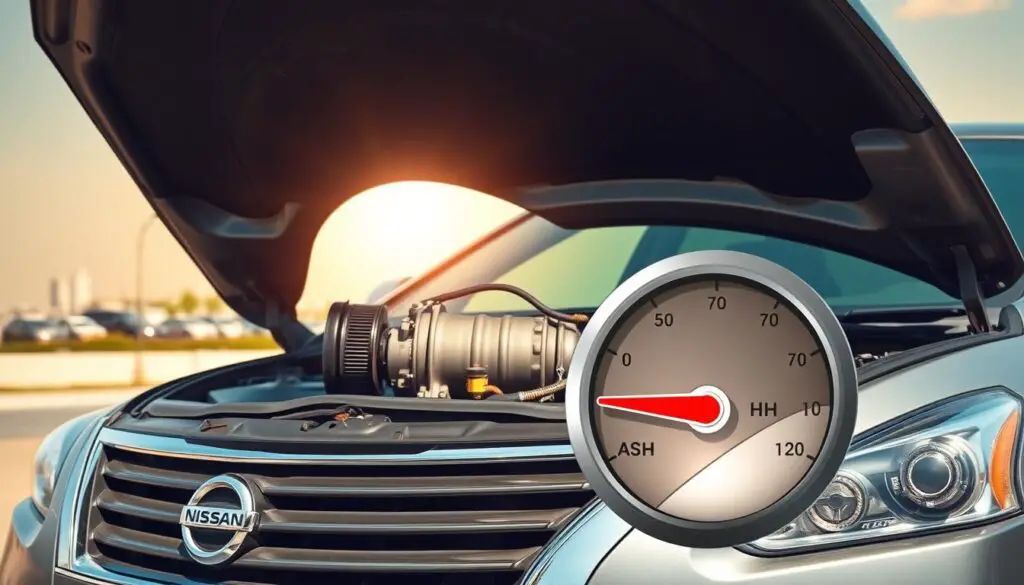 Temperature-Related Performance Problems
Temperature-Related Performance Problems
Having Nissan Altima AC issues can really affect your comfort. It’s important to know if the Altima AC not working is because of the compressor or other parts.
Inconsistent Cooling
Inconsistent cooling means the AC system is not working right. This often happens because of low refrigerant, which can leak. Without enough refrigerant, the compressor can’t cool the air well, leading to uneven temperatures.
Warm Air from Vents
Warm air from the vents might mean the condenser is broken. The condenser is key for cooling the air. If it fails, the AC can’t cool the car as it should. Regular checks can spot problems early.
Temperature Fluctuations
Temperature changes can be annoying and usually point to electrical AC compressor issues. Problems like a bad A/C clutch or cycling switch mess up the system’s temperature control. This makes the air switch between hot and cold.
The Impact of Regular Maintenance on AC Performance
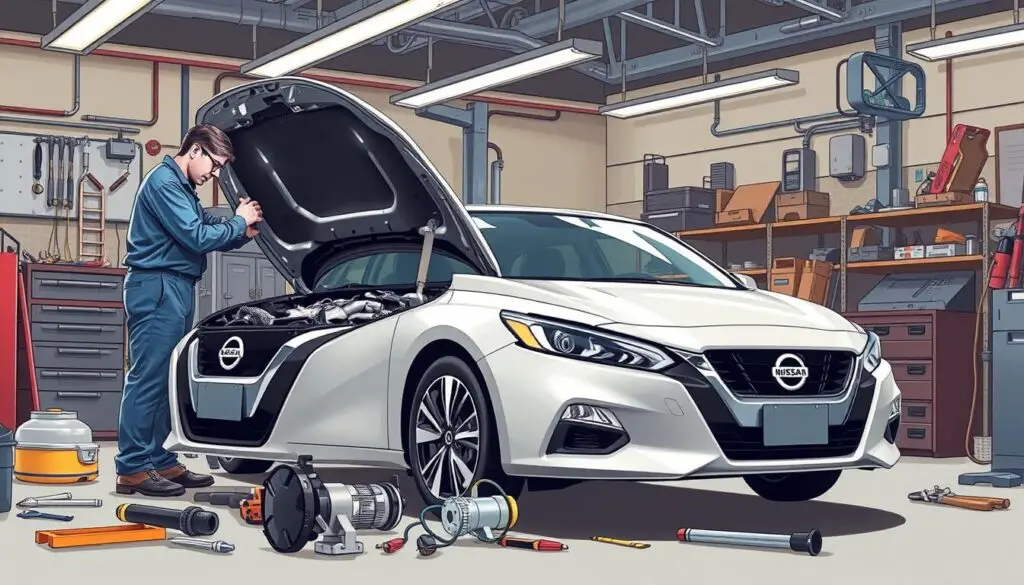
Keeping your Nissan Altima’s AC system in check is key to avoiding Nissan Altima cooling system problems. Regular maintenance ensures all parts work well. This lowers the chance of sudden breakdowns.
Changing the cabin filter every 10,000-20,000 miles is a must. A clean filter helps air flow better and cuts down on AC compressor work. This can help avoid the need for Altima AC compressor repair.
Also, routine checks can spot refrigerant leaks early. Fixing these leaks quickly keeps your AC cool. It also saves money and protects the environment.
Don’t forget to check the AC compressor clutch and electrical connections. Keeping these parts in top shape reduces the risk of compressor failure. This is a common Nissan Altima cooling system problem.
| Maintenance Task | Frequency | Benefit |
|---|---|---|
| Change Cabin Filter | Every 10,000-20,000 miles | Improves airflow and reduces compressor strain |
| Inspect Refrigerant Levels | Annually | Prevents refrigerant leaks and maintains cooling efficiency |
| Check AC Compressor Clutch | Every 15,000 miles | Ensures proper compressor engagement and function |
| Clean Evaporator | Every 30,000 miles | Reduces energy consumption by 30% and maintains effectiveness |
DIY Troubleshooting Steps for AC Problems
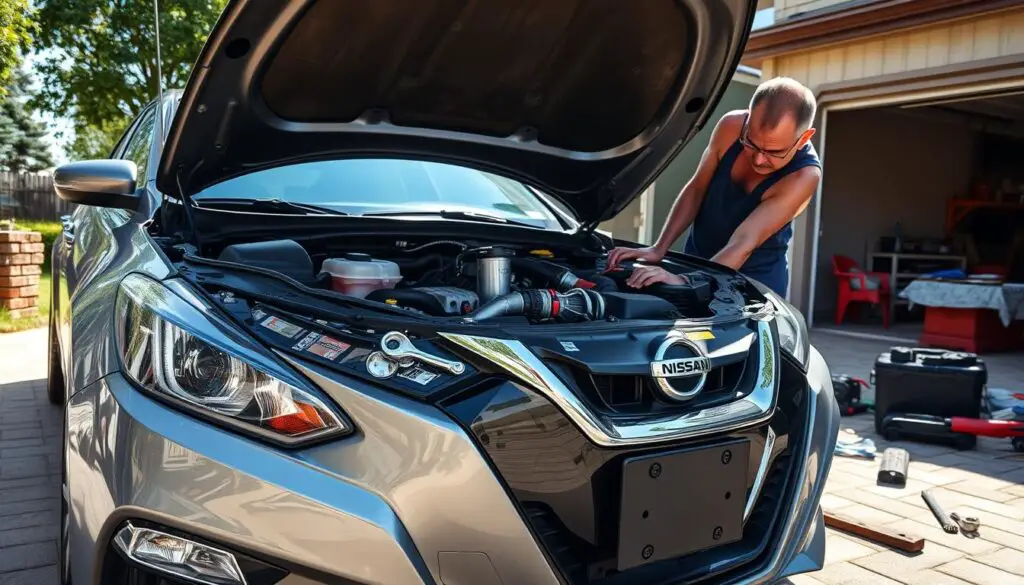
Fixing Altima air conditioning troubleshooting can save you money and time. First, look at the visible parts of the system.
Visual Inspection Guidelines
- Check AC lines for any signs of leaks, such as green or oily spots.
- Look for moisture around connections and hoses.
- Use a UV-light detection kit to identify small, hidden leaks.
Basic Testing Procedures
- Verify refrigerant levels to ensure they are adequate.
- Inspect the AC compressor clutch for proper engagement.
- Examine fuses related to the AC system for any faults.
When to Stop DIY Attempts
- If you detect a refrigerant leak, it’s best to consult a professional.
- Non-engaging compressor clutches may require expert attention.
- Avoid further damage by seeking help when unsure during troubleshooting.
| Troubleshooting Step | Action | When to Seek Help |
|---|---|---|
| Check for Leaks | Inspect AC lines for oily residue or use UV kits | Leak detected |
| Verify Refrigerant Levels | Use a pressure gauge to check refrigerant | Refrigerant low or inconsistent |
| Inspect Compressor Clutch | Observe clutch engagement during AC operation | Clutch does not engage |
| Examine Fuses | Check and replace any blown fuses | Fuse blows repeatedly |
Professional Diagnostic Methods
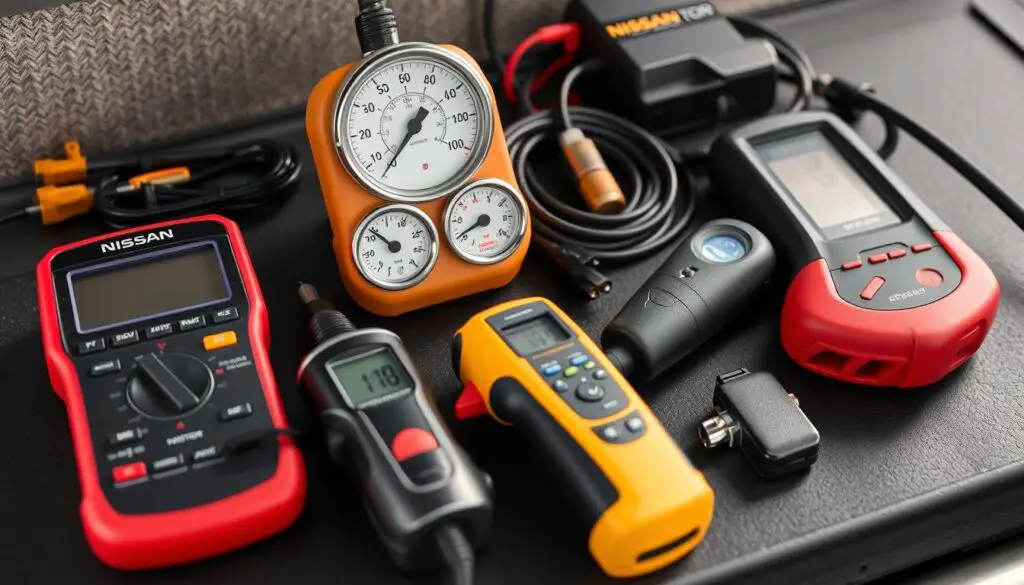
Fixing Nissan Altima AC issues needs exact diagnostics for good Altima AC compressor repair. Certified mechanics use top-notch tools to find problems fast.
Pressure testing is a key method. It checks refrigerant levels. For a 2004 Nissan Altima, the high side should be about 125 psi, and the low side around 18 psi. These numbers help spot leaks or if there’s not enough refrigerant.
- Electrical System Checks: Looking at wiring and connections makes sure electrical issues aren’t causing compressor problems.
- Refrigerant Analysis: Checking refrigerant purity is key. Impurities can block expansion valves and orifice tubes.
- Temperature Monitoring: Measuring temperature drops, like a 20 to 50°F change from condenser inlet to outlet, shows system efficiency.
Professional diagnostics beat DIY methods with special equipment. They make sure everything works right. Proper checks fix current Nissan Altima AC issues and stop future ones. This makes your car’s AC system last longer.
Replacement Options and Costs
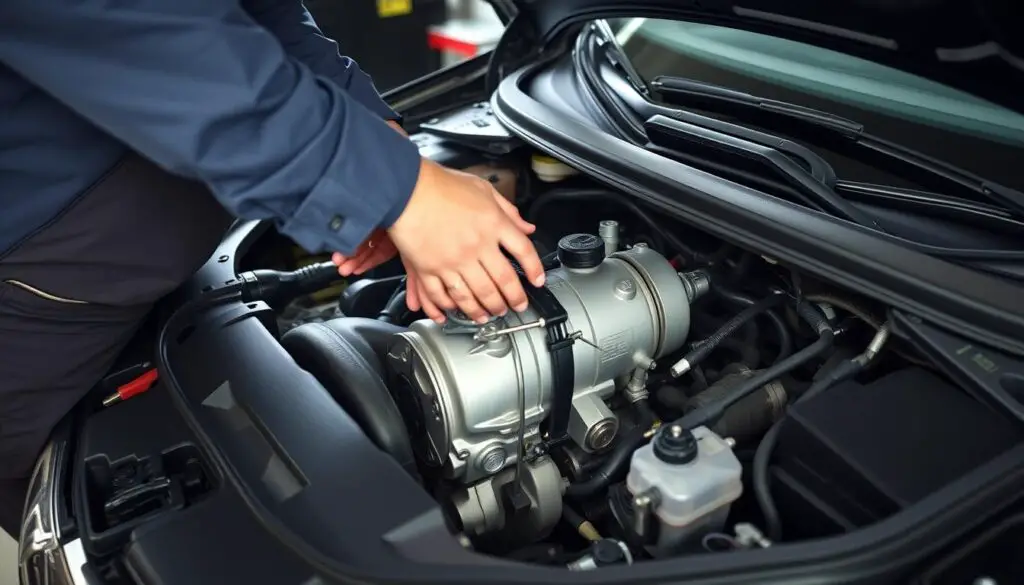
When you need to replace your Nissan Altima AC compressor, picking the right parts is key. It ensures your car runs well and lasts long. Knowing your choices helps you pick what’s best for your budget and quality needs.
New vs. Remanufactured Parts
Choosing a new compressor means you get the latest tech. It comes with a full warranty, giving you peace of mind. Remanufactured parts, on the other hand, are refurbished to high standards but cost less. They might have a shorter warranty than new parts.
Labor Costs Breakdown
The price of Altima AC compressor repair depends on the job’s complexity and the shop’s labor rates. Replacing the AC compressor costs between $860 and $953. This price includes parts and labor, making sure your AC works right again.
Warranty Considerations
Warranties are important when deciding on replacement. New compressors often have longer warranties for parts and labor. Remanufactured compressors might have shorter warranties. Always check the warranty terms to get the right coverage and support.
| Replacement Option | Average Cost | Warranty |
|---|---|---|
| New Compressor | $860 – $953 | 3-5 years |
| Remanufactured Compressor | $500 – $750 | 1-3 years |
| Used Compressor | $200 – $400 | Limited/Limited availability |
Preventing Future AC Compressor Issues
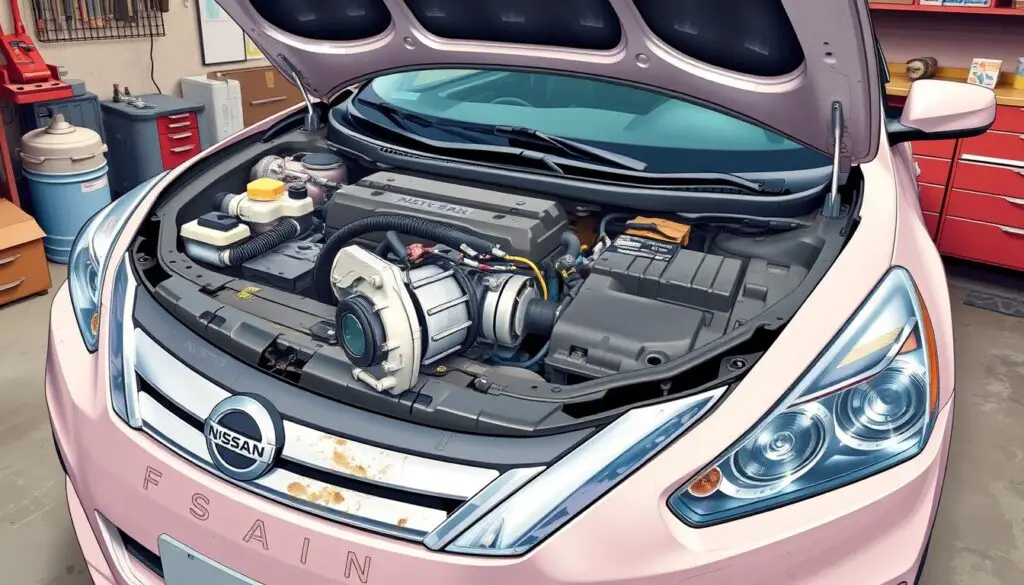
Keeping your Nissan Altima’s cooling system in top shape helps avoid Nissan Altima cooling system problems. Regular maintenance ensures your Altima AC not working becomes a rare issue.
Maintenance Schedule
Adhering to a maintenance schedule is crucial:
- Annually: Schedule a full AC system check-up before summer.
- Every 15,000 miles: Replace the cabin air filter to maintain airflow.
- Seasonally: Run the AC system periodically during cooler months to prevent moisture build-up.
- Refrigerant Levels: Monitor and recharge refrigerant as needed to ensure efficient cooling.
Best Practices
Implementing best practices can extend your AC compressor’s lifespan:
- Use the AC regularly, even in mild weather, to keep the system lubricated.
- Avoid setting extreme temperatures that strain the compressor.
- Keep the condenser clean and free from debris to enhance cooling efficiency.
- Seek professional assistance from qualified technicians, such as those at McCullough NAPA Auto Care, when issues arise.
| Maintenance Task | Frequency | Purpose |
|---|---|---|
| Full AC System Check-Up | Annually | Identify and fix potential cooling system problems |
| Cabin Air Filter Replacement | Every 15,000 miles | Ensure optimal airflow and prevent blockages |
| Run AC in Cooler Months | Seasonally | Prevent moisture buildup and mold growth |
| Monitor Refrigerant Levels | As needed | Maintain efficient cooling performance |
| Condenser Cleaning | Biannually | Enhance cooling efficiency by removing debris |
Environmental Factors Affecting AC Performance
Many environmental conditions can affect your Nissan Altima’s AC system. Knowing these factors helps with Altima air conditioning troubleshooting and keeping it running well.
- Extreme Temperatures: Both very hot and cold weather can strain the AC compressor, leading to reduced efficiency.
- Humidity: High humidity levels make the AC work harder to remove moisture, increasing wear on components.
- Altitude: Higher altitudes can affect refrigerant pressure, impacting cooling effectiveness.
- Regularly check and maintain refrigerant levels.
- Use recirculation mode in high humidity to reduce moisture intake.
- Allow the engine to cool before turning on the AC in extreme heat.
| Environmental Factor | Impact on AC | Maintenance Tip |
|---|---|---|
| Extreme Temperatures | Increases compressor workload | Regular compressor inspections |
| Humidity | Leads to moisture buildup | Ensure proper drainage and filter condition |
| Altitude | Affects refrigerant pressure | Use altitude-adjusted refrigerant charges |
When to Repair vs. Replace Your AC Compressor
Choosing between Altima AC compressor repair and Nissan Altima AC compressor replacement is tough. Knowing what to do helps keep your car running well and saves money.
Cost-Benefit Analysis
First, think about the money. Fixing the compressor is cheaper, with costs around $120 for a recharge. But, if the damage is big, fixing it might cost as much as a new one. This can be thousands of dollars.
Also, consider your car’s age and how many miles it has. Compressors often break down after 60,000 to 70,000 miles. So, getting a new one might be better in the long run.
Long-term Considerations
Think about how reliable it will be in the future. A fixed compressor might not last as long and could cause more problems. This is because of issues like moisture or damaged wiring.
But, getting a Nissan Altima AC compressor replacement could be more reliable. It might not break down as often and keep your AC working better.
| Option | Initial Cost | Long-term Reliability | Potential Future Issues |
|---|---|---|---|
| AC Compressor Repair | $120 – $240 | Moderate | Higher risk of recurring problems |
| AC Compressor Replacement | $1,000+ | High | Lower risk of future issues |
Common Installation Mistakes to Avoid
Installing an AC compressor in your Nissan Altima needs care. Mistakes can cause big Nissan Altima AC compressor problems and expensive Altima AC compressor replacement.
- Improper Refrigerant Charging: Too much or too little refrigerant can harm the compressor and lower cooling.
- Failure to Replace Associated Components: Skipping the replacement of hoses, seals, or filters can cause leaks and system breakdowns.
- Incorrect Electrical Connections: Bad wiring can lead to electrical problems, stopping the compressor from working right.
Getting a pro to install is key. Certified techs know how to avoid Nissan Altima AC compressor problems and do a correct Altima AC compressor replacement.
| Common Mistakes | Consequences |
|---|---|
| Improper Refrigerant Charging | Compressor strain, reduced cooling efficiency |
| Not Replacing Associated Components | Leaks, system failures |
| Incorrect Electrical Connections | Electrical issues, malfunctioning compressor |
Working with a Professional Mechanic
When your Nissan Altima has cooling system issues, getting help from a skilled mechanic is key. They can find the problem and fix it right, making sure your AC works well.
Finding Qualified Technicians
First, look for mechanics with ASE certification. Check out local shops and read what others say about them. It’s smart to pick someone who knows Nissan Altima well, so they get your car’s cooling system right.
Questions to Ask
- What certifications do your technicians hold?
- Have you worked on Nissan Altima cooling systems before?
- What is your diagnostic process for AC compressor issues?
- Can you provide an estimate for the repair costs?
- Do you offer any warranties on your repairs?
Asking these questions helps you get a clear picture of what’s wrong with your car. Talking openly with your mechanic makes the repair process better for everyone.
Conclusion
Knowing about Nissan Altima AC compressor issues is key to keeping your car comfy and efficient. Regular upkeep is vital to avoid problems that make your AC stop working.
Spotting early signs of a failing AC compressor helps a lot. Sounds, uneven cooling, or electrical troubles need quick fixes. This can prevent expensive repairs later.
Getting help from skilled mechanics is important. They can figure out what’s wrong and fix it right. They’ll tell you if you need to repair or replace the compressor.
Preventive steps, like regular maintenance and avoiding mistakes, help your AC compressor last longer. This keeps your car running well and saves you money in the long run.
This guide helps you keep your Altima’s AC system in great shape. Knowing about common problems and fixes lets you enjoy a cool ride all year.
FAQ
What are the common signs of a failing AC compressor in a Nissan Altima?
How does the AC compressor function in a Nissan Altima?
What causes refrigerant leaks in the Nissan Altima AC system?
How can I diagnose AC compressor issues using sound?
What maintenance can prevent AC compressor problems in a Nissan Altima?
When should I consider replacing my Nissan Altima’s AC compressor instead of repairing it?
What are the costs associated with AC compressor repair or replacement in a Nissan Altima?
FAQ
What are the common signs of a failing AC compressor in a Nissan Altima?
Signs include reduced cooling and unusual noises like grinding or squealing. You might also see wear or damage on the compressor. The AC might not work right or cool intermittently.
How does the AC compressor function in a Nissan Altima?
The AC compressor pressurizes and circulates refrigerant. It compresses the refrigerant gas from the evaporator and sends it to the condenser. There, it releases heat and turns into a high-pressure liquid. Then, it goes through the expansion valve and back to the evaporator to cool the air.
What causes refrigerant leaks in the Nissan Altima AC system?
Leaks can come from worn seals, damaged hoses, or cracks in the condenser. Over time, vibrations and temperature changes can damage these parts. This leads to leaks that hurt the system’s efficiency.
How can I diagnose AC compressor issues using sound?
Listen for odd noises like grinding, squealing, or rattling when the AC is on. Grinding might mean bearing failure. Squealing could be a slipping belt or clutch problem. Rattling sounds often point to loose or damaged compressor parts.
What maintenance can prevent AC compressor problems in a Nissan Altima?
Regular maintenance includes checking and replacing refrigerant levels. Also, inspect hoses and connections for leaks. Clean the condenser and evaporator, and make sure the compressor clutch works right. Following the manufacturer’s maintenance schedule can help the compressor last longer.
When should I consider replacing my Nissan Altima’s AC compressor instead of repairing it?
Replace the compressor if it has severe mechanical failures or significant leaks. If repair costs are near or over a new compressor’s price, it’s time to replace. Also, if your car is old and has high mileage, replacing the compressor might be cheaper in the long run.
What are the costs associated with AC compressor repair or replacement in a Nissan Altima?
Repair costs vary but usually range from 0 to 0. Replacement costs are higher, from 0 to
FAQ
What are the common signs of a failing AC compressor in a Nissan Altima?
Signs include reduced cooling and unusual noises like grinding or squealing. You might also see wear or damage on the compressor. The AC might not work right or cool intermittently.
How does the AC compressor function in a Nissan Altima?
The AC compressor pressurizes and circulates refrigerant. It compresses the refrigerant gas from the evaporator and sends it to the condenser. There, it releases heat and turns into a high-pressure liquid. Then, it goes through the expansion valve and back to the evaporator to cool the air.
What causes refrigerant leaks in the Nissan Altima AC system?
Leaks can come from worn seals, damaged hoses, or cracks in the condenser. Over time, vibrations and temperature changes can damage these parts. This leads to leaks that hurt the system’s efficiency.
How can I diagnose AC compressor issues using sound?
Listen for odd noises like grinding, squealing, or rattling when the AC is on. Grinding might mean bearing failure. Squealing could be a slipping belt or clutch problem. Rattling sounds often point to loose or damaged compressor parts.
What maintenance can prevent AC compressor problems in a Nissan Altima?
Regular maintenance includes checking and replacing refrigerant levels. Also, inspect hoses and connections for leaks. Clean the condenser and evaporator, and make sure the compressor clutch works right. Following the manufacturer’s maintenance schedule can help the compressor last longer.
When should I consider replacing my Nissan Altima’s AC compressor instead of repairing it?
Replace the compressor if it has severe mechanical failures or significant leaks. If repair costs are near or over a new compressor’s price, it’s time to replace. Also, if your car is old and has high mileage, replacing the compressor might be cheaper in the long run.
What are the costs associated with AC compressor repair or replacement in a Nissan Altima?
Repair costs vary but usually range from $200 to $500. Replacement costs are higher, from $500 to $1,200, including parts and labor. Remanufactured compressors can be a more affordable option than new ones.
Can low refrigerant levels cause the AC compressor in a Nissan Altima to fail?
Yes, low refrigerant can cause the compressor to overheat and fail early. Keeping refrigerant levels right is key to keeping the compressor working well and avoiding AC system damage.
How often should I service the AC system in my Nissan Altima?
Service the AC system at least once a year. Regular check-ups can catch and fix problems early. This keeps the system working well and extends the AC compressor’s life.
What are the most common AC compressor clutch issues in a Nissan Altima?
Common issues include the clutch not engaging or slipping. These problems can be due to electrical issues, worn parts, or too much strain on the system.
How do environmental factors affect the AC compressor performance in a Nissan Altima?
Extreme temperatures, high humidity, and altitude can affect the AC compressor. High temperatures increase the compressor’s workload. High altitudes can change refrigerant pressure levels. Humidity can cause moisture to enter the system, leading to corrosion and damage.
What should I look for when choosing a professional mechanic for AC compressor repair in my Nissan Altima?
Look for certified technicians with Nissan experience and proper certifications. Check for positive customer reviews. Ask about warranty options and ensure they use quality parts for the repair.
Can I perform DIY troubleshooting on my Nissan Altima’s AC system?
Yes, you can do basic troubleshooting like checking for leaks and refrigerant levels. But, complex issues like internal compressor failures or refrigerant recharging should be handled by professionals to avoid damage.
What warranty options are available for a new or remanufactured AC compressor in a Nissan Altima?
New compressors usually come with a warranty of one to five years. Remanufactured compressors have shorter warranties, from six months to a year. Always check the warranty details for adequate coverage.
How do I maintain optimal AC performance in my Nissan Altima?
For optimal AC performance, regularly service the system and keep refrigerant levels up. Replace worn-out parts and ensure the condenser and evaporator are clean. Avoid overusing the AC in extreme conditions and let it cool down before turning it off.
,200, including parts and labor. Remanufactured compressors can be a more affordable option than new ones.
Can low refrigerant levels cause the AC compressor in a Nissan Altima to fail?
Yes, low refrigerant can cause the compressor to overheat and fail early. Keeping refrigerant levels right is key to keeping the compressor working well and avoiding AC system damage.
How often should I service the AC system in my Nissan Altima?
Service the AC system at least once a year. Regular check-ups can catch and fix problems early. This keeps the system working well and extends the AC compressor’s life.
What are the most common AC compressor clutch issues in a Nissan Altima?
Common issues include the clutch not engaging or slipping. These problems can be due to electrical issues, worn parts, or too much strain on the system.
How do environmental factors affect the AC compressor performance in a Nissan Altima?
Extreme temperatures, high humidity, and altitude can affect the AC compressor. High temperatures increase the compressor’s workload. High altitudes can change refrigerant pressure levels. Humidity can cause moisture to enter the system, leading to corrosion and damage.
What should I look for when choosing a professional mechanic for AC compressor repair in my Nissan Altima?
Look for certified technicians with Nissan experience and proper certifications. Check for positive customer reviews. Ask about warranty options and ensure they use quality parts for the repair.
Can I perform DIY troubleshooting on my Nissan Altima’s AC system?
Yes, you can do basic troubleshooting like checking for leaks and refrigerant levels. But, complex issues like internal compressor failures or refrigerant recharging should be handled by professionals to avoid damage.
What warranty options are available for a new or remanufactured AC compressor in a Nissan Altima?
New compressors usually come with a warranty of one to five years. Remanufactured compressors have shorter warranties, from six months to a year. Always check the warranty details for adequate coverage.
How do I maintain optimal AC performance in my Nissan Altima?
For optimal AC performance, regularly service the system and keep refrigerant levels up. Replace worn-out parts and ensure the condenser and evaporator are clean. Avoid overusing the AC in extreme conditions and let it cool down before turning it off.
Can low refrigerant levels cause the AC compressor in a Nissan Altima to fail?
How often should I service the AC system in my Nissan Altima?
What are the most common AC compressor clutch issues in a Nissan Altima?
How do environmental factors affect the AC compressor performance in a Nissan Altima?
What should I look for when choosing a professional mechanic for AC compressor repair in my Nissan Altima?
Can I perform DIY troubleshooting on my Nissan Altima’s AC system?
What warranty options are available for a new or remanufactured AC compressor in a Nissan Altima?
How do I maintain optimal AC performance in my Nissan Altima?

Jack Thompson is a writer and seasoned auto mechanic with over 15 years of experience in the automotive industry. Known for his expertise in vehicle mechanics, Jack has a deep understanding of car and truck systems. His skills, honed through years of hands-on experience, have made him a trusted name in the field. Jack is committed to providing valuable insights into car maintenance and repair, helping vehicle owners keep their vehicles in top condition.

